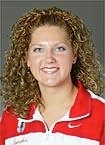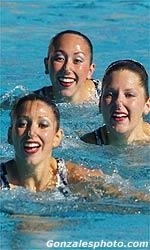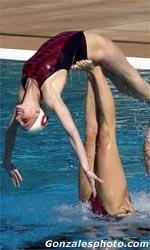 |
| Stephanie Joukoff |
My hero is my synchronized swimming (synchro) coach, Stephanie Joukoff. She is a wonderful person who is always there for you either as a friend, or as a coach who will help you always try your hardest and be confident in yourself all the time. She will always believe in you as long as you believe in yourself. She tells us that she will push us to our limit, but even though it is just her job, she will be one of our most memorable friends. She takes a ton of time from her life to teach us all she knows about synchro, to make-up routines for our meets, to take us to dinner at Wendy's sometimes, but most of all, just to be our friend and believe in us.
 |
| Trio Competition |
Stephanie is my hero and I look up to her because she is an amazing, successful, and wonderful person. She got a scholarship to Stanford University for synchronized swimming. She graduated with an International Relations major and Slavic language and literature minor. Stephanie was a member of the 1999 USA Junior National Team, and they earned a bronze medal worldwide! She was also a member of the 1998 Junior National Team; they earned a gold medal at the American Cup. Stephanie is a dedicated and committed athlete, and was recognized for her talent in 1997 when she was named Athlete of the Year!
 |
Where and when were you born and where did you grow up?
I was born in Walnut Creek, CA at John Muir Hospital on June 10, 1981. I grew up in Walnut Creek, CA just off Ygnacio Valley Road near Mt. Diablo.
Do you have any brothers or sisters and, if so, younger or older?
I have a younger brother who is 17 years old. He is a baseball player (pitcher) at Northgate High School. His name is Mark Philip Joukoff.
 |
| Stephanie's Team Competition-Flip/Lift |
At what age did you start synchro and on what team?
I started synchro at the age of 7 with the Walnut Creek Aquanauts. On my first day of practice we had to swim 20 whole laps and I thought synchro was super hard.
How did you get involved with synchro?
I went to one of the Aquanauts’ annual swim shows and thought the swimming was amazing. The girls’ costumes were amazing and they looked so graceful in the water. I didn’t know that the sport was so hard until I started doing it myself. After 2 years in the sport, I could have cared less about the make-up and the costumes (what attracted me at the age of 7). I cared much more about competing and winning.
How did you handle growing up being one of the only people in your school who did synchro? What do you do or think when people make fun of synchro because it isn't a very popular sport, and they don't understand how difficult it really is?
Synchronized swimmers are a rare breed. It is not the most common sport and people’s reactions are mixed. Growing up in Walnut Creek, a lot of other younger girls had tried synchronized swimming because of the Aquanauts’ legacy and success. Most, however, dropped out after only a year and could attest to the fact that the sport was extremely difficult. Other people, however, who know very little about synchronized swimming think that it is not a real sport. This can be extremely frustrating because synchronized swimmers train extremely long hours, both in and out of the water. Not feeling as though you have gained the same respect and admiration as other athletes in their respective sports can be disappointing. One thing to remember, however, is that synchronized swimming is still a very new sport and people still equate it with water ballet…NOT the same thing. As time passes and people learn more and more about synchronized swimming, perceptions will change. Until then…you just have to keep your chin up.
Why did you decide to stop doing synchro after you graduated?
I think that every great athlete has to make a lot of very difficult choices regarding their future in a particular sport and their future in life. When I graduated from Stanford, I felt that I had accomplished everything that I wanted to accomplish in synchro and was ready to move on with my life in a different direction. I had already swam for 15 years as a part of the Walnut Creek Aquanauts, was a member of the US Junior National Team, and spent four years on Stanford’s Varsity Synchronized Swimming Team. I had competed at every level: novice, age group, regional, national, international and, of course, in the collegiate circuit. In combination with my academics, synchro helped me to gain entrance to one of the top universities in the country where I was able to go to school and train with the best students and athletes in the world while on scholarship. It opened so many doors in my life, but at the end of college, I thought it was time to hand in my “suit.” I have no regrets about my decision, but I sincerely miss being part of a team, competing, and, of course, winning.
Why did you decide to become a coach for WCA?
Growing up, I was lucky enough to be surrounded by amazing role models: coaches and athletes alike, who gave selflessly of themselves to the sport and to others. After I graduated, I wanted to continue to be involved in the synchro community and help give back to a sport that had given so much to me. I also wanted to try to be a positive role model for younger athletes. Coaching has been one of the best experiences in my life.
How did you gain the confidence in yourself and control being nervous in such big, worldwide competitions?
At any competition nerves are natural and there isn’t a perfect solution to getting rid of them because everyone reacts to stress differently. However, there are a few things that I think athletes can do to combat nerves. First of all, practice makes perfect. Every time you practice something you should become more and more confident in your ability to complete a certain action and, hopefully, complete it successfully. Secondly, every athlete should know what she needs to do in order to get ready to compete -- perhaps more time stretching, more time visualizing, more time landrilling, etc. No one wants to feel rushed or not ready to compete. Allowing yourself enough time to prepare before the competition starts will help calm nerves because you will feel ready to compete.
What were some important commitments in life, so far, that you had to decide between? And how did you decide?
Synchro is a huge commitment and there are many things that I had to sacrifice, whether it was for a practice or for a competition. While at the time I may have been sad, looking back, I would not change anything. Through synchro, I was allowed the opportunity to travel around the country and the world, to compete against amazing athletes, to make lifelong friends, and to participate in a lot of other things that most kids my age did not get to do. For instance, the USOC sent 4 of my teammates and me to Hawaii for 5 days (all expenses paid) to swim at a fundraiser, I was featured in a documentary on teenage girls in sports, I traveled to Rome at the age of 16 to compete in the Rome Open, and the list goes on. I think that every time I chose to sacrifice something else in my life for synchro I just thought about how many other opportunities I had already received because of synchro and how many more would come my way. Hey, it was worth being at practice after all.
What would you say are 5 of the most important qualities or skills that a person would need for going through life?
1. A strong work ethic
2. A positive attitude
3. A warm demeanor
4. A balance between teamwork and individual success
5. Work hard, play hard.
What were 3 very important lessons that your parents taught you that you have referred back to a lot in your life so far?
1. This is really funny, but both my parents used to tell me, “Kick butt and take names” before I left for every synchro meet, before any test, or before any other huge event in my life. And I always used to hear that in my head and get excited.
2. My parents taught me to be honest with myself, with them, and with everyone I encountered. To this day, I don’t think I have any secrets or things that I haven’t shared with those I love the most.
3. My parents always told me that everything happened for a reason and not to be disappointed. If I missed out on one thing, they said that something else would come my way. And it has, in one odd form or another.
What would you say are some important things that have helped you be so successful in synchro, school, work, relationships, etc.?
I think that believing in what you are doing is the most important part of life. This basically translates into “passion.” I am a very passionate person about everything in my life. I was/am passionate about my education, about my sport, about succeeding in my career, and I really have a huge heart when it comes to my family and friends.
Page created on 10/6/2008 11:37:59 AM
Last edited 9/10/2018 12:51:07 AM
